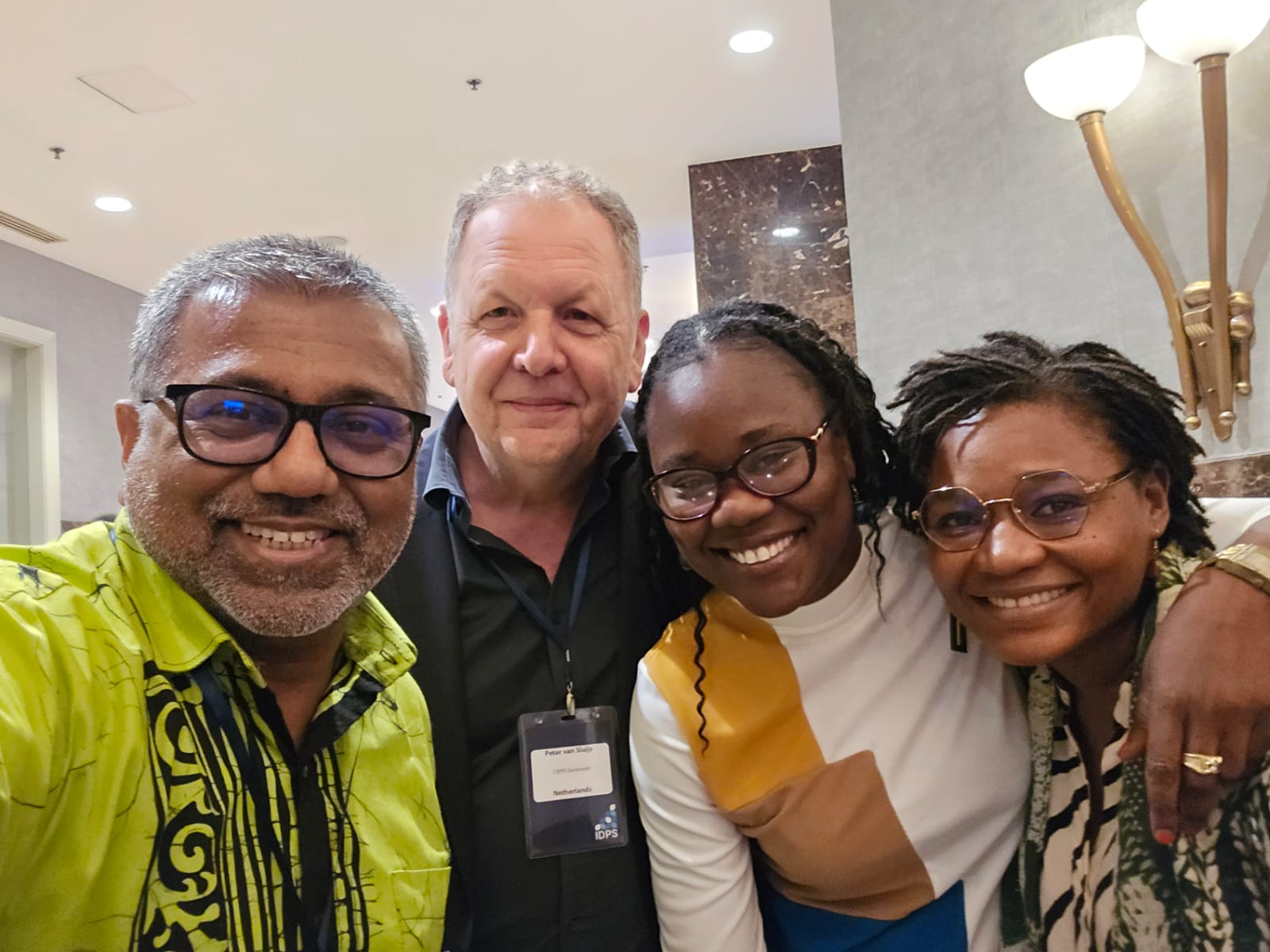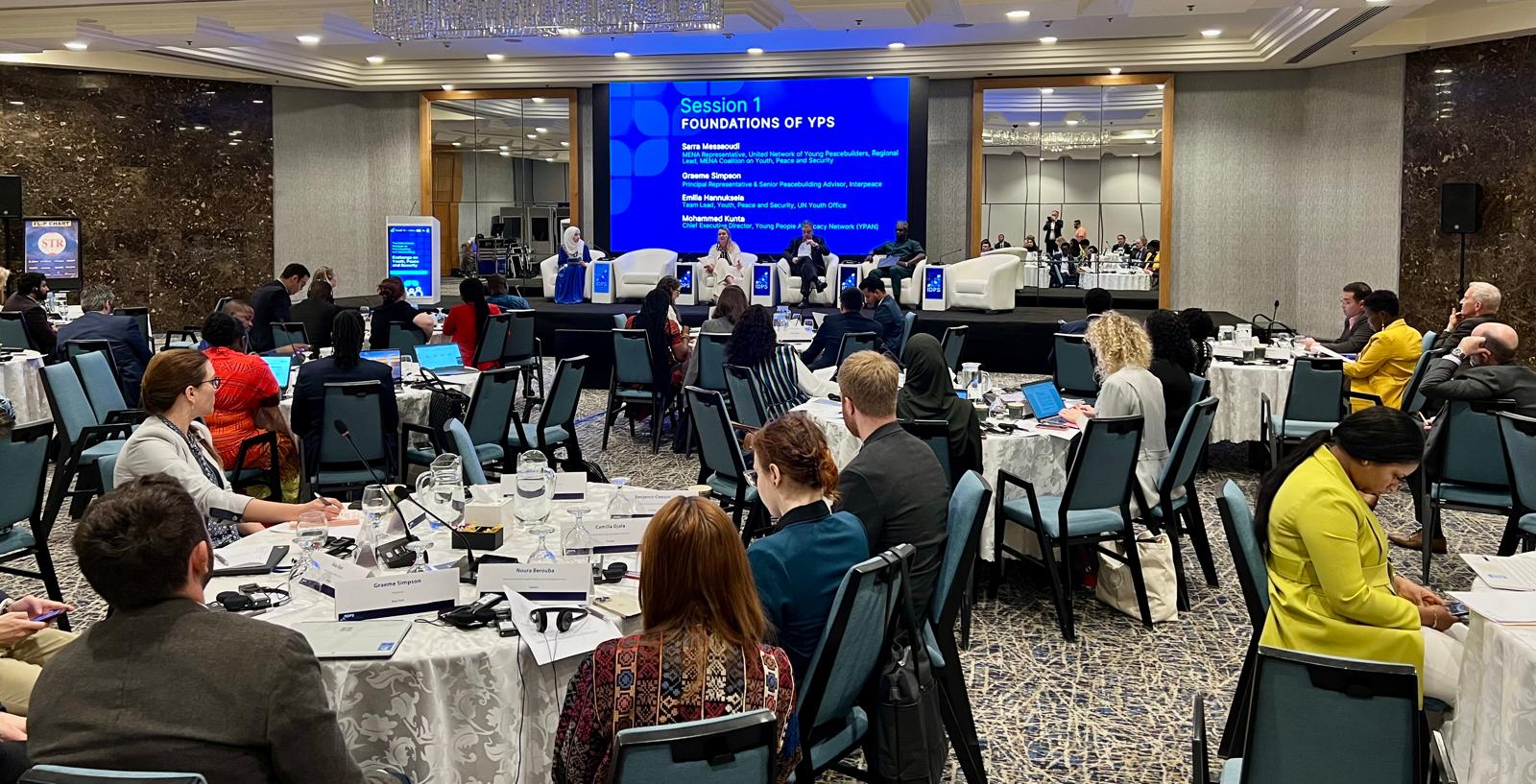
Empowering Youth Voices: Highlights from the IDPS Youth, Peace, and Security Exchange (April 2024)
Constituency members of the International Dialogue on Peacebuilding and Statebuilding (IPDS) came together at the end of April during the IDPS Youth, Peace and Security Exchange. The Exchange was organised in line with the Stockholm Declaration with the aim of discussing the uptake and follow-up of the Youth, Peace and Security (YPS) Agenda in order to share and foster innovative approaches and local/national initiatives in implementing the YPS Agenda and linking peacebuilding and the meaningful inclusion and participation of youth. It brought together a diversity of peacebuilding stakeholders from across the region in Amman, Jordan, CSPPS representatives and Secretariat included, as well as other civil society organisations, international financial institutions, regional organisations, national authorities and development partners.
What is the Youth, Peace and Security Agenda?
Despite their key role in building and sustaining peace, youth are still largely excluded from decision-making processes. However, the meaningful engagement of young people in conflict prevention and peacebuilding processes has been highlighted for 10 years following the UN Security Council in three important resolutions (2250, 2419, 2535). These landmark resolutions indeed recognise “the important and positive contribution of youth in efforts for the maintenance and promotion of peace and security” and consequently urge Member States to give young people a greater voice in peace processes and decision-making at all levels through adapted innovative mechanisms. From then, the YPS Agenda has been developed with entities working toward this spreading the Agenda and supporting its implementation.
- You can learn more about the YPS Agenda through this link: Youth, Peace and Security | PEACEBUILDING (un.org)
About the event
Feedback as received from CSPPS representatives on this two-day event have been very positive praising the engaged and inclusive discussions, inspiring stories, and exchanges on similar issues from various country coalitions. Participants engaged in wide-ranging dialogues going from foundations of the YPS Agenda to financing youth engagement and initiatives, and lessons from in-country and regional initiatives at both the civil society and governmental levels. The Amman exchange provided an opportunity to both hear and reflect on these different topics while allowing participants to bring in their own knowledge and lived-through experiences.
CSPPS representatives present also valued the skillful moderation of the various sessions allowing for a direct engagement with the audience, which resulted in interesting exchanges on inspiring stories from young peacebuilders and their counterpart colleagues at (inter-)governmental levels. CSPPS-members have expressed their gratitude for being given the opportunity to meet their peers and representatives from countries facing similar issues. The meeting allowed to strengthen ties and build new relationships with other YPS actors. Experiences shared provided ample suggestions for moving the YPS-agenda to a next level.
Among the main takeaways from the event, this exchange provided an opportunity for CSPPS members to connect with their peers and colleagues to discuss potential new partnership prospects. It was also the opportunity for civil society to bring to the fore the crucial role its network plays in pursuit of progress on the YPS-agenda at international level.
YPS Agenda: balance between positive evolutions and remaining challenges
The latest report of the UN Secretary-General on Youth, Peace and Security has been released in early March 2024 and describes well the split situation of the Agenda between great advance and persistent obstacles. Indeed, the report takes stock on how the YPS agenda is advancing and is structured. It highlights “advancements in institutionalising the youth and peace and security agenda, with many Member States and regional organizations developing new strategies and initiatives [...] However, persistent challenges remain, such as the growing mistrust between young people and governments, and discriminatory laws and practices based on age, which remain prevalent in many countries and hinder the meaningful participation of young people.”
In the same way, the IDPS-YPS Exchange allowed to bring light in a more tangible way on both the incredible efforts already undertaken by all stakeholders toward the realisation of the Agenda, and on the road still to be travelled.
First, there is a common constation that actions undertaken as part of the Agenda are beginning to bear fruit with a clear augmentation of meaningful participation of youth in peace processes. Governments from across the world are progressively developing by breaking long-term political barriers on youth implication, or in best cases by implementing their own National Action Plan. Thus, a clear political willingness of involving young people in elections, governance and leadership is observable. More than being simply beneficial for the youth cause, the actions undertaken to implement the YPS Agenda also appeared to be at the foundation of a certain calm and economical development.
However, if these positive evolutions cannot be ignored, some obstacles remain tenacious. At the top of the podium, the YPS Agenda suffers from a clear lack of financing and investments for which all participants are calling for a transformation from constatation to concrete actions. Second, despite the fact that some governments are becoming closer to youth, some others on the contrary cultivate a growing distrust with young people and adopt more and more discriminatory strategies to prevent youth from taking part in decision making processes. Moreover, other governments simply demonstrate no political interest from youth causes. Last but not least, there is the lack of data that shows good practices on the implementation of the YPS Agenda. This lack puts the emphasis on the importance of events such as the IDPS-YPS Exchange that precisely allow involved stakeholders to spread their experience, and make connections on similar issues and responses.
These outcomes will be reflected in the upcoming IDPS Steering Group meeting happening in Paris, France on 30-31 May 2024 with concrete next steps to put in place for the YPS Agenda, in line with its strategic priorities for 2024-2026.
A word to conclude
As a global civil society network, CSPPS and its members stand ready to contribute further to the spreading and strengthening of the YPS Agenda, acting as a link between young peacebuilders and authorities.
Gathering representatives from various constituencies, and having inclusive dialogues during IDPS-YPS Exchange enabled civil society actors and youth to have their voices heard, and to contribute to exploring solutions to override remaining barriers they still encounter in their participation in peace political processes.
To go further on the YPS Agenda
- UN Guide providing insights, examples and guidance to support government actions to institutionalise and advance YPS: YPS-guide-for-public-officials-1.pdf (un.org)
- Global policy paper presenting strategic action plan to move from youth-inclusive norms towards youth-inclusive practices in designing and implementing peace processes: YPS-five-year-strategic-action-plan.pdf (youth4peace.info)
- Third report of the UN Secretary-General on Youth, Peace and Security: S/2024/207 (undocs.org)


